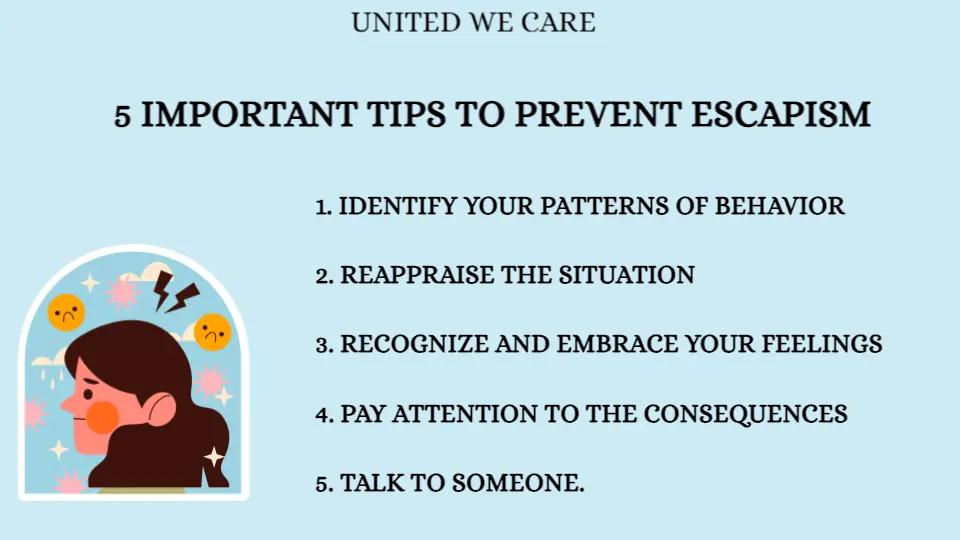Introduction
Escapism is a tendency to turn to activities or behaviors as a means of avoiding the realities of life. It enables people to distract themselves from challenging situations. These situations can evoke multiple range of emotions which can be difficult to deal with. Consequently, people may resort to behaviours and activities which in that moment help them take their mind off the distressing situation.
What is Escapism
Stress levels being on a perpetual rise can be attributed to the fast paced modern world, with multitudinous things impinging upon our sensory system at a given point in time. The discomfort that comes along with it can get difficult to deal with. People often seek escapism to avoid distress and the pain associated with the distress.
Is escapism always bad? The answer needs to be situated in the context of what leads to escapism. Escapism at a visceral level, is about the fight or flight response.
Relying on positive distractions to manage stress in that moment is helpful. This includes talking to someone, playing a sport, engaging in a hobby, and stepping away from a distressing situation to regain a sense of control. The key lies in understanding that it is important to unravel the feelings and work towards resolving them by building emotional awareness and turning to healthy strategies.
Is Escapism a Mental Illness?
Escapism is often used to deal with the negative emotions following a traumatic event. Any situation which is distressing in nature can contribute to a host of emotions that can be difficult to manage. In this sense, escapism can be seen as a response to stress and situations that can lead to feelings of anxiety, fear, loneliness, dissatisfaction, shame, and a host of other emotions. The need to escape a threat is like a reflex.
How situations are perceived and interpreted to a large extent determine the nature of one’s response to that situation. As a part of illness, people may tend to withdraw and isolate themselves owing to the illness that they are suffering from. One needs to take into consideration a cluster of symptoms and not one symptom in isolation. Therefore escapism can be seen as a means to cope, and not an illness.
Common Forms of Escapism
Escapism can take multiple forms. The most common form of escapism in the modern day is the internet. Spending excessive time online while scrolling the internet, playing games online, social media is a form of escapism where one tries to distract oneself in order to keep their mind off things and situations which are perceived as distressing.
A lot of people struggle with unhealthy eating patterns, at the base of which lies a tendency to escape feelings that are difficult to navigate. Some people may get absorbed by their work, which often leads to a lack of work-life balance, which consequently has negative consequences for their interpersonal relationships and overall well-being.
Using substance as a means to avoid processing difficult emotions is another form of escapism which has negative consequences. These forms of escapism can only exacerbate the already existing concerns which can be addressed and resolved otherwise.
Reasons Behind Escapism
One may resort to escapism in different domains of life, personal and professional alike. Some common reasons behind escapism are:

Conflicts in relationships
- Illness
- Financial problems
- Transitions
- Job dissatisfaction
- Heavy workload
- A break in career
- Changes within the organization
- Lack of support and mentorship
These transitions are dealt with differently by different individuals depending on how they appraise the situation, the availability of resources needed to overcome them, and
the level of social support that is provided. Feelings of helplessness, anger, frustration, and sadness can contribute to escapism in such situations. It is important to understand, however, that isolating oneself can make the already existing situation worse. Conversely, by reaching out for support, one can deal better with challenging situations.
How to Prevent Escapism-5 Important Tips
Some ways to prevent escapism are-

- Identify your patterns of behavior– Try to observe your tendencies and how you usually react in distressing situations. Without being critical, try to identify these behaviors from the vantage of self-improvement.
- Reappraise the situation– Often, we tend to be biased in our thinking. Instead of perceiving situations as black or white, be realistic and explore the different ways of handling the situation better.
- Recognise and embrace your feelings– One turns to escapism as a means to avoid feelings that may be difficult to deal with. Relying on self-awareness and having compassion for oneself is the key.
- Pay attention to the consequences– Keeping in mind the consequences of your actions can be helpful. Take into account the alternatives and gauge what can be done differently.
- Talk to someone– While some situations can be difficult to deal with, reaching out to someone we can trust and talk to can help manage the distress.
Conclusion
Escapism involves responding to challenging situations and the distress associated with these situations. It takes multiple forms for different people. Escapism is based on the premise of avoiding pain and discomfort that comes with the challenges of everyday living, traumatic events from the past, and other related issues. Recognizing the situations which lead to escapism can be helpful in reducing the frequency of the same. Escapism may provide momentary relief in the form of distraction. However, the consequences, in the long run, can predispose one to greater risks.
It is, therefore, important to rely on healthy strategies that can help an individual cope with stress. Positive strategies to manage stress can be in the form of engaging in physical activity, playing a sport, and following creative pursuits. Instead of avoiding situations that are perceived as distressing, further leading to unresolved feelings and additional stress, talking to a professional and considering alternative ways to deal with crises can be beneficial.
References
Henning, B., & Vorderer, P. (2001). Psychological escapism: Predicting the amount of television viewing by the need for cognition. Journal of Communication, 51(1), 100-120.
Gabbiadini, A., Baldissarri, C., Valtorta, R. R., Durante, F., & Mari, S. (2021). Loneliness, escapism, and identification with media characters: an exploration of the psychological factors underlying binge-watching tendency. Frontiers in Psychology, 12, 785970.










